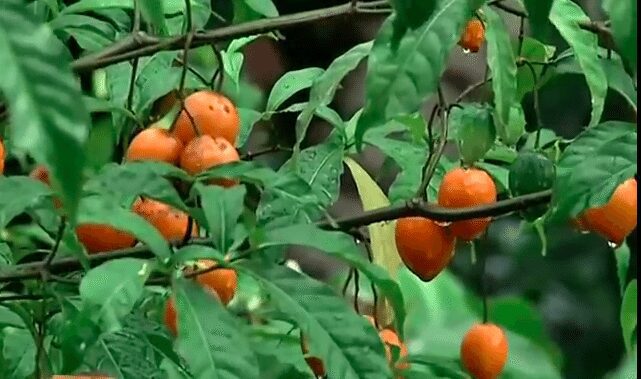Are you curious about the roots of the iboga plant? This episode of the Gabonese television show Ca S’Explique, which is based on a report by Yann Guignon that was commissioned by the Gabonese government, gives us a peek into the psychedelic plant’s past, present and future.
Iboga is primarily found in Gabon, as well as a few surrounding countries. The plant’s active ingredient, ibogaine, has amazing medicinal properties, but its habitat is threatened, which could soon create an acute shortage worldwide.
“The Iboga plant is known for its therapeutic virtues in traditional medicine as well as modern medicine,” explains Ca S’Explique host Hernill Kozas’s Kombila. “It serves to assist addicted persons to wean off hard drugs.”
To explore the traditional uses of iboga, Ca S’Explique co-host Gwladys Eyang-Ango takes viewers to a Bwiti ritual, or spiritual discipline practiced by certain populations in Gabon. Several tribe members under the supervision of spiritual practitioners are given powdered iboga root, which “allows the minds to travel far into the afterlife,” Gwladys says. The effect sends them to the beginning of time to relive the memories of previous generations and communicate with their ancestors, according to one of the shamans.
Gwladys visits another ceremony, the Bwiti Misoko, where one of the guides tells her that a dancer who has taken iboga can have many visions, but “the most important is to see oneself, to know oneself.”
“Insiders do not have the same vision but it’s the same road,” the shaman says.
Iboga, we’re told, can also be used to heal problems brought on by disease, mental disorders or supernatural spells. However, there are hazards to the experience as well. The powder can provoke hallucinations and cardiac arrhythmias, and there have been people who died while using it, although the exact cause of death is disputed.
“When someone is initiated, we don’t always know if the person has a properly functioning liver or a fragile heart,” Jean-Noel Gassita, an iboga researcher, says in the video. “Most people who die because of iboga were already sick.”
Iboga is finding its way in the modern world as well. Gwladys visits a research center and meets a scientist who shows her how it is effective against hypertension in rats. But perhaps its most compelling use is in treating addiction, particularly to opiates like heroin and prescription painkillers.
The show interviews Kenneth Alper, a scientist in New York who is studying the effects of ibogaine on drug addiction. Alper says no one understands exactly how ibogaine works, but it can cure people of their cravings for opiates after just one dose. Unfortunately, research on its effects is still limited. “You will not find any studies by the pharmaceutical companies simply because there is no profit to be made with ibogaine,” Alper says.
Nevertheless, word is getting out. Clinics are popping up around the world in countries where ibogaine is legal, like Costa Rica, New Zealand and Mexico. Jonathan Dickinson, director of the Global Ibogaine Therapy Alliance, suggests that there are about 75 to 100 clinics worldwide
The expansion of treatment centers has the potential to help untold numbers of people suffering from addiction, but there is a major downside to the expanded profile: The iboga plant is disappearing. It was classified as a national heritage plant in Gabon in 2000, but it is currently considered threatened. Although people aren’t permitted to collect the plant without authorization from the government, there is nevertheless excessive harvesting.
Guignon, an iboga specialist who lives in Gabon, notes that there are 160 million people in the world addicted to opioids. To meet the demand, the price of iboga has risen by 800 percent in the last decade, Guignon says. “I believe that iboga could disappear in the public domain in less than 5 years,” he warns.
Other factors also contribute to the potential iboga shortage. Elephants are crucial for spreading iboga seeds, and they are disappearing in Gabon as well. Deforestation and climate change play roles, as does the increased urbanization of the human population.
To address some of these challenges, the Global Ibogaine Therapist Alliance met last year “to establish standards around safety and sustainability in the production and use of ibogaine.”
One solution would be to expand the area where ibogaine is produced. Israel is already growing the plant in greenhouses, and other countries that share similar climates to Gabon could also cultivate it as well. Hopefully, with careful conservation and stewardship we won’t see this miracle plant disappear from the wild.
